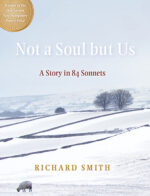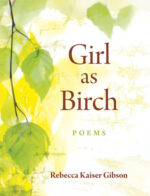
Not a Soul but Us: A Story in 84 Sonnets
Poetry by Richard Smith
Bauhan Publishing, April 2022
Not a Soul but Us: A Story in 84 Sonnets by Richard Smith is the winning collection of the 2021 May Sarton New Hampshire Poetry Prize. In it, Smith tells the story of mid-fourteenth century Yorkshire, when the plague pandemic wipes out half the inhabitants of a remote village. Left behind is a twelve-year-old shepherd boy, who, with the help of his dog, survives near-starvation and a brutal winter and keeps his flock alive. In the months and years that follow, he struggles to reconnect with the life around him. Judge Meg Kearney said this of her selection, “A mastery of craft. Music. An undulating urgency of tone that leaves no doubt about the emotional impulse that drives the work. A voice that you trust, even when the syntax or the material is difficult. And that material needs to feel relevant, of substance, necessary. Not a Soul But Us is an achievement on every front.”

